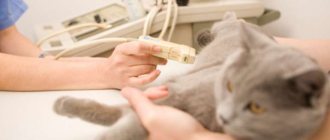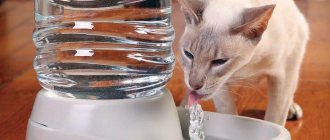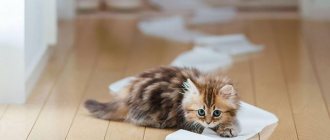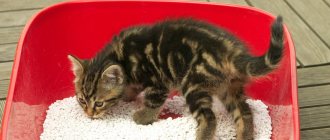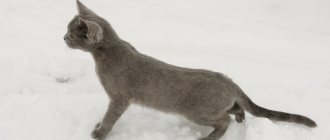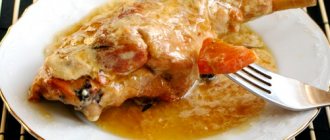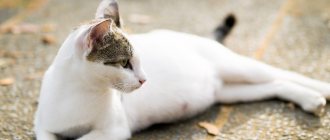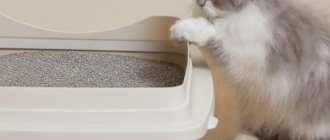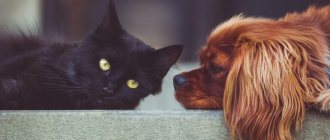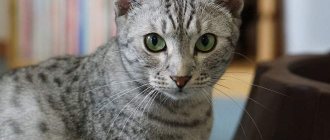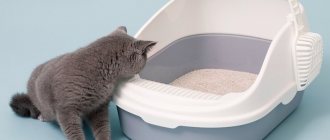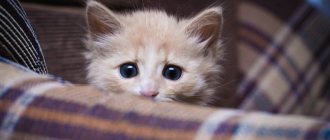The diet has its own peculiarities - it is based on an increased intake of nutrients, proteins, calories, and vitamins into the body.
With this feeding it is recommended:
- Eliminate smoked, spicy, pickled, salty and fatty foods from your diet.
- Avoid sweets and baked goods.
- Limit fish consumption.
- Do not feed your cat raw meat to avoid the possibility of parasite infection.
You might be interested in:
- What to feed sterilized cats
Is it worth changing your usual diet?
Many pet owners - especially those who are not yet fully experienced - are interested in how to feed a pregnant cat so that it is beneficial for her and her future kittens. Of course, a pregnant cat should receive more nutritious food, which should also contain a number of special supplements necessary for the proper development of the fetus. However, this does not mean at all that as soon as you find out about the expected replenishment, the animal needs to be suddenly transferred to specialized expensive food. In such a situation, there is a high risk that your pet will simply refuse to eat unusual food.
Dry or wet?
Veterinarians do not advise suddenly changing your animal’s usual feeding pattern - this will help avoid unnecessary stress both for him and for you. The main thing here is to avoid sudden and unexpected changes for your pet.
If you previously fed your cat dry kibble, continue doing so. If you sometimes added wet canned food or pouches to your dry diet, do not change your usual approach. The same applies to a completely natural diet - if the animal is accustomed to it, then leave everything as is, just review the ratio of nutrients and add special vitamin and mineral complexes for pregnant animals.
What should food for pregnant cats contain?
The health and proper development of her future kittens depends on how a cat eats during pregnancy, so her menu should be healthy and balanced. Diets for such animals should be significantly higher in calories than their classic counterparts - however, the calorie content should be increased not through carbohydrates, but through proteins and healthy fats.
Properly formulated food for kittens and pregnant cats should contain the following ingredients.
- Sufficient amount of protein. Protein is the main building material for any body, so a pregnant cat's diet should contain a lot of protein. Moreover, it is desirable that it be of animal rather than plant origin. Sources of proper protein can be meat, poultry, fish, and seafood.
- Fats. Fats are another important component of the pregnancy diet, since the fatty acids they contain are very important for the proper formation of the brain of future kittens. It is important that your cat gets enough omega-3 fatty acids and especially DHA. Their sources can be fish oil, vegetable oils or special additives.
- Moderate amount of carbohydrates. Carbohydrates are an important source of energy, but your pet should not have too many of them in their diet, as overuse of them can lead to obesity. Sources of proper carbohydrates should be vegetables, fruits or grains.
- Vitamin and mineral supplements. Pregnancy is an energy-consuming process on which the animal spends a lot of effort. Therefore, in order for your pet to be energetic and healthy, its diet must contain vitamins A, groups B, C, D and E, as well as minerals - especially calcium, which is responsible for bone formation, and taurine, which helps absorb healthy fats.
Information on the packaging
On the back of the package there is the inscription “Made in Russia” and the colors of the Russian tricolor. Since the food is produced in Russia, it is not surprising that all information about the product is presented exclusively in Russian.
A large portrait of a kitten on the bag is visible from a great distance, which helps you find the diet among other products on the pet store shelf. On the package there is a number 2 with a + sign, that is, the diet is intended for kittens and cats starting from 2 months of age.
On the package we also see the Premium mark, which indicates that the food belongs to the premium class, but does not say anything about its quality. We strongly recommend that all users read our article on feed classification to gain a better understanding of this topic.
The manufacturer declares the beneficial effects of food on the body of pets with a series of badges - “Active development and growth”, “Energy”, “Ideal skin and coat”, “Strengthening immunity”. The back of the package explains in general terms how this happens, but there is clearly not enough information.
There is also a note here “Digestibility >75%”. This is an approximate indicator that almost no manufacturer of ready-made food puts on the bag. Comparing TiTBiT food with other diets for kittens and pregnant cats on this indicator is also impossible because digestibility depends on the functioning of the gastrointestinal tract and other health characteristics of each individual pet.
The fact that the package indicates that the product does not contain artificial flavors and dyes is certainly a plus, but such a characteristic of Titbit food as “100% natural product” does not automatically indicate its quality. To better understand what the concept of “naturalness” means as applied to ready-made food and its ingredients, we recommend reading a separate article on this topic.
Features of feeding a cat during pregnancy
Number of feedings
During the first weeks of pregnancy, you can feed your cat her usual portions twice a day, supplemented only with folic acid (this should be discussed with your veterinarian). However, by the end of the third week, you can begin to gradually increase the portion size and switch from feeding twice a day to three times a day.
If your pet makes it clear that three solid feedings are not enough for her, you can switch her to four, five or even six meals a day - but then the portion size will have to be reduced to avoid overfeeding.
Portions
Starting from the fourth week, the animal's energy and nutritional needs will steadily increase, so from this time until the end of pregnancy, you need to increase the cat's diet by about 10% every week. The animal should always have access to fresh drinking water, especially if you prefer to feed dry food.
After the birth of the kittens, the animal should continue to be fed with pregnancy or kitten formulas, as they contain sufficient nutrients necessary for the lactation period. There is no need to limit the size of portions at this time - the cat itself will regulate how much food it needs.
Weight gain
Make sure your cat is not malnourished, but also don't let her overeat to prevent obesity. But don't be alarmed if your cat gains a small amount of excess weight towards the end of pregnancy. This is a natural increase that is necessary in order to give birth and raise healthy offspring. Under normal conditions, this weight will be lost during lactation, which is an extremely energy-consuming process.
Natural food products
Products are chosen fresh, rich in proteins, calcium, carbohydrates and beneficial elements.
Among them:
- boiled lean meat: chicken, beef, rabbit, turkey, veal;
- vegetables: beets, pumpkin, cauliflower, carrots, zucchini;
- cottage cheese, curdled milk, natural yoghurts, biokefir;
- cereals: buckwheat, oatmeal, sprouted wheat grains.
To reduce the risk of developing constipation due to intestinal problems, add to the main diet:
- low-fat broths in which meat was cooked;
- warm milk (in small quantities);
- 3 – 4 drops of flaxseed, olive, sesame oil (added to food);
- boiled beets or puree from them;
- young shoots of oats, wheat, barley.
Approximate diet
In the second week of pregnancy, the cat’s appetite increases, therefore the amount of food is increased by 10% of the previous volume, from the second month - by 50%. In the last weeks before childbirth, appetite decreases, it is recommended to reduce portions, and the number of feedings is calculated based on the needs of the expectant mother. An adult animal needs 180-200 grams per day to be satisfied.
Menu for 1 day:
Daily food intake for cats
Feeding malnourished cats
Feeding pregnant cats
- Morning : 30 gr. cottage cheese mixed with ground sprouted grains of wheat or buckwheat. Another option is 40 gr. milk porridge puree made from oatmeal.
- Second breakfast – 3 tablespoons of curdled milk or yogurt.
- Lunch : 90 – 120 gr. lean meat, 30 gr. vegetables Boil everything, chop, add ½ teaspoon of vegetable oil.
- Dinner : vegetable puree – 40 g, boiled egg yolk.
Types of meat and vegetables are alternated to diversify the diet; salt and spices are not used. The food is heated to room temperature, comfortable for the stomach. After feeding, the leftover food is removed from the dishes so that it does not spoil.
Raw or cooked foods
Only boiled meat and fish are used for feeding. Raw foods increase the risk of infection with helminths and other dangerous diseases.
Fresh vegetables are rich in fiber, which contributes to the normal functioning of the digestive system. This food is not popular among cats; rare individuals consider it a delicacy.
The vegetables are boiled, a puree is prepared, which is mixed with chopped meat and given to the animal.
What not to give to a pregnant cat
There are foods, the consumption of which can negatively affect the health of your pet and her babies, so it is better to exclude them from the animal’s diet. The list of prohibited or potentially dangerous products includes the following.
- Raw fish. Fish may contain parasites and helminths, so it is better to replace it with a small amount of boiled fish or remove it from the diet completely.
- Milk. The body of an adult cat does not absorb lactose from milk well, so instead it is better to give the cat cottage cheese, kefir or low-fat natural yogurt.
- Smoked, salty food, sausages. Such products contain an excessive amount of salt, which is harmful to the animal’s gastrointestinal tract.
- Sweets. Too much sugar is bad for your teeth and can also lead to obesity and even diabetes.
Basic concepts of nutrition during cat pregnancy
A cat's appetite grows quickly at the beginning of pregnancy, and you need to be prepared for this!
Regardless of whether this is the first pregnancy or not, not only a restructuring of internal organs occurs, but also a change in metabolism as a whole.
At the initial stages, the cat’s appetite grows, the absorption of all types of substances improves, which naturally leads to an increase in body weight. But the prenatal periods are characterized by weight loss, which, with improper nutrition, can result in depletion of the body.
Menu deficiencies at this time will cause a deficiency of necessary substances, which can negatively affect the musculoskeletal system of the future offspring and lead to delays in its overall development.
Below are the relationships between dietary deficiencies of certain substances during cat pregnancy and the consequences for the offspring:
- A lack of minerals leads to a lack of necessary elements for the formation of bone tissue, which can cause rickets in kittens;
- Salt deficiency negatively affects dental health;
- A lack of vitamins can lead to disturbances in the functioning of the central nervous system, growth retardation and congenital malformations;
- A deficiency of basic amino acids and proteins in most cases leads to miscarriage, since these are the main materials for the construction of new organisms.
All of the above says one thing: your pet’s diet during pregnancy should not only be varied, but also balanced and complete. And it should be done this way from the first weeks of the cat’s pregnancy.
Dry diets
Royal Canin Mother & Baby cat
A complete, super-premium dry food suitable for pregnant and lactating cats, as well as kittens aged one to four months. It has an increased calorie content (444 kcal per 100 g), therefore it completely covers the animal’s energy needs. Suitable for all breeds.
Peculiarities
- The balanced high-protein formula contains 34% protein from dehydrated poultry meat, 25% fat, rice as a source of carbohydrates, as well as plant fiber for normal digestion.
- Contains DHA fatty acids, essential for proper brain development in kittens.
- It has increased digestibility due to the content of LIP proteins and a complex of prebiotics.
- Enriched with vitamins, calcium, phosphorus and taurine necessary for development.
Winner with chicken
Premium Russian food suitable for everyday feeding of pregnant and lactating animals, as well as kittens up to one year old. The high-protein composition helps the cat maintain energy and activity, and a complex of useful additives ensures healthy growth and proper development of babies.
Peculiarities
- As protein sources it contains 35% dried and 5% fresh chicken meat, as well as pork liver hydrolysate.
- Chicory extract and a complex of antioxidants in combination with vitamin supplements strengthen the immunity of mother and babies.
- Dried beet pulp provides the right amount of fiber and normalizes digestion.
- Omega-3 and omega-6 unsaturated fatty acids promote brain development in kittens, and vitamin-rich carrots have a beneficial effect on vision development.
Bozita Kitten Grain free Chicken
Complete grain-free super-premium food for pregnant and lactating women from the Swedish brand Bozita. It consists primarily of natural ingredients and does not contain bone meal, grain or harmful chemical additives.
Peculiarities
- The high content of natural dehydrated chicken meat (29%), as well as dry beef and pork protein, creates all the conditions for healthy development and muscle growth.
- Rich in healthy fatty acids and protein, fresh salmon is easy to digest and has a positive effect on vision and brain development.
- Potatoes, peas and dried beet fiber are used as sources of fiber, which helps the digestive tract.
- Contains no grains, GMOs, colors, artificial flavors or preservatives.
Karmy Kitten Turkey
Russian dry premium food created for feeding nursing, pregnant cats and kittens up to one year of age. The nutritious, easily digestible formula will provide your pets with the right amount of energy and all the beneficial substances necessary for the proper functioning of all body systems.
Peculiarities
- Contains dehydrated turkey meat, easily digestible vegetable protein and hydrolyzed meat proteins for the normal development of internal organs and muscles of future babies.
- Brewer's yeast extract is responsible for the high quality of wool, and the vitamin complex stimulates the protective functions of the immune system.
- Helps maintain the correct ratio of calcium and phosphorus in the cat's body to ensure proper skeletal formation in kittens.
- Pro- and prebiotics maintain the natural balance of intestinal microflora, and Yucca Schrödinger extract reduces unpleasant stool odor.
- Thanks to the small size of the granules, they are easy to chew even by miniature animals.
Leonardo Kitten
German super-premium complete food, which can be used for daily nutrition of cats of all breeds during pregnancy and lactation. Easily digestible thanks to the content of fresh meat and chia seeds that regulate intestinal function. The addition of natural malt makes the mixture more flavorful and attractive even to picky animals.
Peculiarities
- Contains 30% fresh chicken and 27% dried poultry protein, plus dried egg, herring meal and ground krill.
- Chia seeds normalize digestion and stimulate the immune system, and brewer's yeast improves wool quality.
- The composition includes folic acid, which is necessary for the proper healthy development of the fetus during the first weeks of pregnancy.
- Sources of carbohydrates are rice, malt, rye and corn.
Brit Care Cat Crazy Kitten
Czech premium everyday food intended for feeding cats during pregnancy and lactation, as well as for kittens up to 12 months. An easily digestible formula based on a large amount of protein and natural fiber provides your pet with energy and helps avoid problems with the gastrointestinal tract.
Peculiarities
- The high protein formula contains 25% dried chicken and 22% fresh chicken.
- Salmon oil, rich in fatty acids, helps the formation of the nervous system and brain of babies, and a complex of vitamins (including vitamin C) activates the body's protective functions.
- Rice and rice bran provide the cat’s body with the right “slow” carbohydrates and stimulate intestinal function.
- Dried apples and sea buckthorn are sources of plant fiber and vitamins.
- The mineral complex (calcium, phosphorus, zinc, iron, selenium) supports the proper functioning of all body systems.
Products for nursing cats
The diet of a nursing cat must include foods rich in protein and calcium.
- Protein. The main building material of cells. If the mother cat does not receive enough of it, her milk will be inferior, which means the kittens are at risk of rickets, slow growth and exhaustion.
- Calcium. A mineral responsible for the condition of hair and teeth. Its deficiency can provoke muscle spasms, convulsions, cause rickets and even lead to the death of the animal.
Calcium-rich foods that should be included in the diet of a nursing cat are milk, fermented milk products, salmon, sardines and white cabbage.
What can you feed
A nursing cat can and should be fed everything that actively replenishes its supply of proteins, fats, carbohydrates, microelements, and vitamins. It’s easier to do this using ready-made industrial feeds - everything is already balanced there, and the dosage is indicated on the packaging. But some breeders and their pets prefer natural food.
In this case, the diet of a nursing cat mother should include: sea fish (salmon, sardines), eggs (chicken, quail), fermented milk products (cottage cheese, yogurt, kefir, cheese), legumes (peas, lentils, soy), meat ( beef, veal), poultry (chicken, turkey), cereals (buckwheat, rice, oats), vegetables (carrots, cabbage).
What not to feed
List of 8 foods prohibited for a nursing cat:
- River fish is less digestible and can be infected with parasites.
- Raw meat is poorly digestible and creates additional stress on the digestive system during the intense postpartum period of lactation.
- Pork is excluded due to its high fat content.
- Salty, spicy, sweet - everything that is unnatural for a cat’s diet is “ugly”.
- Sausage, smoked meats - a lot of fat, salt, preservatives. There is little benefit, much harm.
- Potatoes are not digestible in any form, either raw or boiled.
- Bones (fish, bird) are dangerous and therefore contraindicated.
- Flour and butter are empty carbohydrates, no nutrients, only the threat of diabetes and obesity.
Diet
As long as the mother cat is feeding her kittens, she is free to eat as much as she wants and whenever she wants. Usually, this is 4-6 times a day instead of the usual two. The owner is only required to ensure that the bowl is filled and the daily amount is evenly distributed.
The portion size for natural feeding is selected experimentally, based on the size and appetite of the nurse, as well as the number of her offspring.
